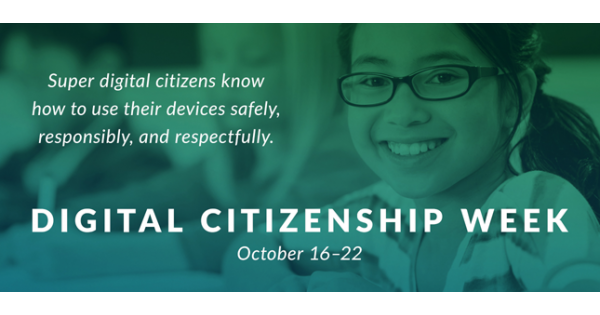The California State Legislature has formally declared the week of October 16–22, 2016, as Digital Citizenship Week! What is Digital Citizenship, you ask? Good question.
Read on to learn how to raise kids who are savvy about their use of technology at school and at home, why we must all be upstanders (and not bystanders) when it comes to cyberbullying, and how to take Common Sense Media’s #DeviceFreeDinner challenge.
Around the country, the education community celebrates Digital Citizenship Week during the third week of October, so now is a perfect time to learn about this timely idea, and to share the basics with your family.

Think of Digital Citzenship as basic guidelines around behavior and etiquette for kids growing up in today’s digital world. You might call it manners in your house, others might argue that these are simply best practices that are key to success in today’s 24/7 connected world. But the overall idea is this: if you are handing your child a tablet or phone, he or she should be as equipped to manage that device as they would be a car when you hand over the keys.
Basic digital citizenship starts with family agreements about the use of technology, extends into modeling and teaching good online manners for children including proper copyright and citation practices), and extends vitally to making sure they harness technology for learning.

One way to support Digital Citizen idea is to take the #DeviceFreeDinner Challenge promoted by Common Sense.
In today’s 24/7 digital world, we could all use a little break from our devices. Keeping devices off the dinner table gives families much-needed time to share and connect face-to-face. Research shows that kids who eat dinner with their families are happier and healthier. Benefits include better vocabulary and academic performance, healthier eating habits, and fewer problems with behavior or substance abuse. Read more about why device-free dinners are a healthy choice.
It goes without saying that schools should be also be teaching children the basic tenets of safe, responsible and ethical use of technology as basic preparedness for the world. That’s where the word “citizenship” enters into the picture. A school that is conscientious about it’s use of technology can use Common Sense’s free “dig-cit” ideas into their curriculum as a programatic way to teach these basic tenets.
Here are the basic ideas of Digital Citizenship as defined by Common Sense, and you can learn more about them here.
-
Self-Image & Identity
-
Relationships & Communication
-
Digital Footprint & Reputation
-
Cyberbullying & Digital Drama
-
Information Literacy
-
Internet Safety
-
Privacy & Security
-
Creative Credit & Copyright
These are topics that Common Sense teaches in schools, but for the sake or your family, it’s really just important to note that:
a/ this is an ongoing topic for which your children will need guidance.
b/ conversation on this topic opens many doors – as your kids grow, you’ll have endless opportunities to ask them what they’re doing, what they like and what they don’t like online.
c/ these conversations offer a window into what they care about and affords the opportunity to share your own values and ideas.
A school or a household that practices good digital citizenship does so as a preventative practice, a philosophy of mindful use and community-focused values. But sometimes, circumstances get out of control and a young person gets bullied and can there is a risk that she or he harms themselves. Cyberbullying is a heartbreakingly real thing, and part of raising good kids today means that they’re sensitive to meanness and will stand up for others who may be suffering.
Take a moment this week to discuss the important topic of cyberbullying so that your children are empowered to act as “up standers” if they see someone being consistently and deliberately mean online. Here are tips for talking with kids about cyberbullying from Common Sense Media, including what to do if your child is being bullied online and resources to recommend to your school and ways to delve deeper into the subject.
Common Sense has many resources that can be useful in your home, neighborhood, or school. Take a look at these multiple conversation cases that you can use to center conversation with parent groups at school and in your neighborhood.

